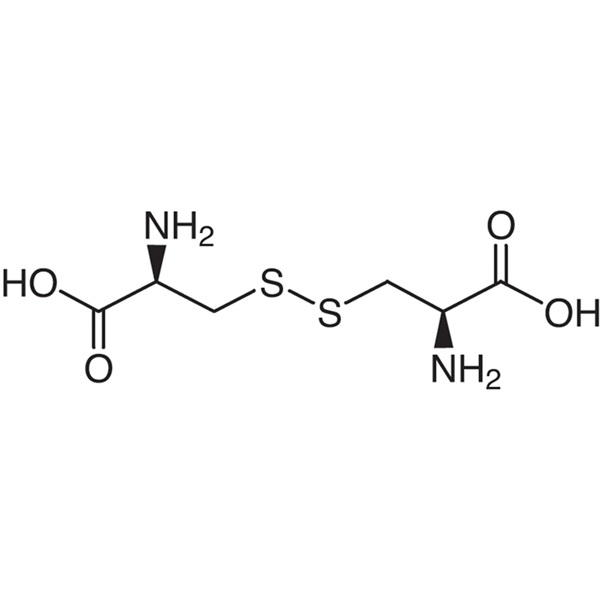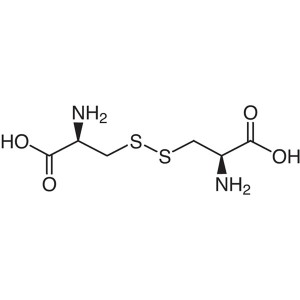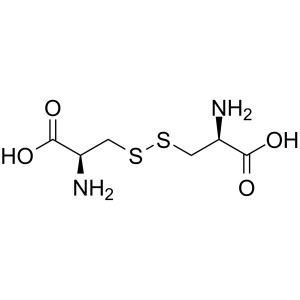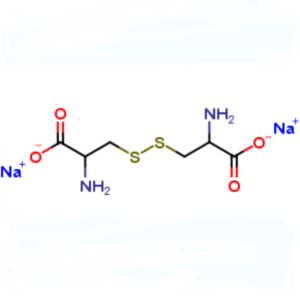L-Cystine CAS 56-89-3 (H-Cys-OH)2 Assay 98.5~101.0% (Titration) Factory High Quality
Shanghai Ruifu Chemical Co., Ltd. is the leading manufacturer and supplier of L-Cystine (CAS: 56-89-3) with high quality. L-Cystine is mainly used in pharmaceuticals, food additives, cosmetics and other industries.
As one of the largest amino acids suppliers in China, Ruifu Chemical manufactures qualified amino acids and derivatives up to international standards, such as AJI, USP, EP, and FCC standard. We can provide worldwide delivery, small and bulk quantities available. Purchase L-Cystine, Please contact: alvin@ruifuchem.com
| Chemical Name | L-Cystine |
| Synonyms | L-(-)-Cystine; (H-Cys-OH)2; Laevo-Cystine; (-)-Cystine; (-)-3,3'-Dithiobis(2-Aminopropanoic Acid); 3,3'-Dithiobis-L-Alanine |
| Stock Status | In Stock, Production Capacity 2000 Tons per Year |
| CAS Number | 56-89-3 |
| Molecular Formula | C6H12N2O4S2 |
| Molecular Weight | 240.29 |
| Melting Point | >240℃(dec.) (lit.) |
| Boiling Point | 468.2±45.0℃ |
| Density | 1.68 |
| Solubility | Insoluble in Water, Ethanol and Ether. Dissolves in Dilute Hydrochloric Acid |
| Solubility in HCl | Almost Transparency |
| Stability | Stable. Incompatible with Strong Oxidizing Agents. |
| Sensitive | Sensitive to Light |
| Storage Temp. | Store Long-Term at 2-8℃ |
| COA & MSDS | Available |
| Product Categories | Amino Acids and Derivatives |
| Brand | Ruifu Chemical |
| Items | Inspection Standards | Results |
| Appearance | White Crystals or Crystalline Powder, Tasteless | Conforms |
| Identification | Infrared Absorption Spectrum | Conforms |
| Specific Rotation [α]20/D | -218.0° to -224.0°(C=2, 1N HCl) |
-218.6° |
| State of Solution (Transmittance) | Clear and Colorless ≥98.0% | 98.5% |
| Chloride (Cl) | ≤0.020% | <0.020% |
| Sulfate (SO4) | ≤0.020% | <0.020% |
| Ammonium (NH4) | ≤0.020% | <0.020% |
| Iron (Fe) | ≤10ppm | <10ppm |
| Heavy Metals (Pb) | ≤10ppm | <10ppm |
| Arsenic (As2O3) | ≤1.0ppm | <1.0ppm |
| Other Amino Acids | Chromatographically Not Detectable | Conforms |
| Loss on Drying | ≤0.20% | 0.10% |
| Residue on Ignition | ≤0.10% | 0.04% |
| Assay | 98.5 to 101.0% (Titration: Anhydrous Basis) | 99.8% |
| pH Test | 5.0 to 6.5 | 5.6 |
| Origin | Non-Animal Source | Conforms |
| Residual Solvents | Conforms | Conforms |
| Conclusion | Accords with the Standard of AJI92; USP37 | |
| Shelf Life | 24 Months From Manufacture Date if Stored Properly | |
Package: Fluorinated bottle, Aluminium foil bag, 25kg/cardboard drum, or according to customer's requirement.
Storage Condition: Keep the container tightly closed. Store in a cool, dry (2-8℃) and well-ventilated warehouse away from incompatible substances. Keep away from sunshine; avoid fire and heat sources; avoid moisture.
Shipping: Deliver to worldwide by air, by FedEx / DHL Express. Provide fast and reliable delivery.
DEFINITION
Cystine contains contains NLT 98.5% and NMT 101.5% of C6H12N2O4S2, as L-Cystine, calculated on the dried basis.
IDENTIFICATION
A. INFRARED ABSORPTION <197K>
B. OPTICAL ROTATION, Specific Rotation <781S>: -215 to -225, determined at 20°
Sample solution: 20 mg/mL, in 1 N hydrochloric acid
C. The RF value of the principal spot of the Sample solution in the test for Organic Impurities corresponds to that of the Standard solution.
ASSAY
PROCEDURE
Sample solution: Transfer about 0.1 g of Cystine to a glass-stoppered flask, and dissolve in a mixture of 2 mL of dilute sodium hydroxide (1 in 20) and 10 mL of water. Add 10 mL of potassium bromide solution (200 g/L in water), 50.0 mL of 0.1 N potassium bromate VS, and 15 mL of dilute hydrochloric acid (17 in 100).
Immediately insert the stopper into the flask, and cool in an ice water bath. Allow to stand protected from light for 10 min.
Titrimetric system
(See Titrimetry <541>)
Mode: Residual titration
Titrant: 0.1 N potassium bromate VS
Back-titrant: 0.1 N sodium thiosulfate VS
Endpoint detection: Colorimetric
Equivalency: Each mL of 0.1 N potassium bromate VS is equivalent to 2.403 mg of C6H12N2O4S2 on the dried basis.
Analysis: Add 1.5 g of potassium iodide, and after 1min, titrate with 0.1 N sodium thiosulfate VS, using starch TS as the indicator. Perform a blank determination, and make any necessary correction.
Acceptance criteria: 98.5%~101.5% on the dried basis
IMPURITIES
Inorganic Impurities
RESIDUEON ON IGNITION <281>: NMT 0.1%
CHLORIDE AND SULFATE, Chloride <221>: NMT 200 ppm. A 0.7-g portion shows no more chloride than corresponds to 0.40 mL of 0.01 N hydrochloric acid.
CHLORIDE AND SULFATE, Sulfate <221> NMT 200 ppm. A 1.2-g portion shows no more sulfate than corresponds to 0.25 mL of 0.020 N sulfuric acid.
IRON <241>: NMT 10ppm
HEAVY METALS, Method I <231>: NMT 10ppm
Organic Impurities
PROCEDURE
Standard solution: Dissolve a quantity of USP Cystine RS in 1 N hydrochloric acid, and dilute with water to obtain a solution having a known concentration of about 0.02 mg/mL.
Sample solution: Dissolve a quantity of Cystine in 1 N hydrochloric acid, and dilute with water to obtain a solution having a known concentration of about 10 mg/mL.
System suitability solution: Dissolve quantities of USP Cystine RS and USP Arginine Hydrochloride RS in 1 N hydrochloric acid, and dilute with water to obtain a solution having a known concentration of about 0.4 mg/mL each.
Chromatographic system (See Chromatography <621>, Thin-Layer Chromatography.)
Mode: TLC
Adsorbent: 0.25-mm layer of chromatographic silica gel mixture
Application volume: 5μL
Developing solvent system: A mixture of ammonia and 2-propanol (3:7)
Spray reagent: Dissolve 0.2 g of ninhydrin in 100 mL of a mixture of butanol and 2 N acetic acid (95:5).
Analysis
Samples: Standard solution, Sample solution, and System suitability solution
Proceed as directed for Chromatography <621>, Thin-Layer Chromatography. After air-drying the plate, spray with Spray reagent, and heat between 100° and 105° for 15 min. Examine the plate. The chromatogram from the System suitability solution exhibits two clearly separated spots.
Acceptance criteria: Any secondary spot from the Sample solution is not larger or more intense than the principal spot of the Standard solution.
Individual impurities: NMT 0.2%
Total impurities: NMT 2.0%
SPECIFIC TESTS
LOSSON ON DRYING <731>: Dry a sample at 105℃ for 3 h: it loses NMT 0.2% of its weight.
ADDITIONAL REQUIREMENTS
PACKAGING AND STORAGE: Preserve in well-closed containers, and store at a controlled room temperature.
USP REFERENCE STANDARDS <11>
USP Arginine Hydrochloride RS
USP Cystine RS
How to Purchase? Please contact Dr. Alvin Huang: sales@ruifuchem.com or alvin@ruifuchem.com
15 Years Experience? We have more than 15 years of experience in the manufacture and export of a wide range of high quality pharmaceutical intermediates or fine chemicals.
Main Markets? Sell to domestic market, North America, Europe, India, Korea, Japanese, Australia, etc.
Advantages? Superior quality, affordable price, professional services and technical support, fast delivery.
Quality Assurance? Strict quality control system. Professional equipment for analysis include NMR, LC-MS, GC, HPLC, ICP-MS, UV, IR, OR, K.F, ROI, LOD, MP, Clarity, Solubility, Microbial limit test, etc.
Samples? Most products provide free samples for quality evaluation, shipping cost should be paid by customers.
Factory Audit? Factory audit welcome. Please make an appointment in advance.
MOQ? No MOQ. Small order is acceptable.
Delivery Time? If within stock, three days delivery guaranteed.
Transportation? By Express (FedEx, DHL), by Air, by Sea.
Documents? After sales service: COA, MOA, ROS, MSDS, etc. can be provided.
Custom Synthesis? Can provide custom synthesis services to best fit your research needs.
Payment Terms? Proforma invoice will be sent first after confirmation of order, enclosed our bank information. Payment by T/T (Telex Transfer), PayPal, Western Union, etc.
Risk Codes
R36/37/38 - Irritating to eyes, respiratory system and skin.
R22 - Harmful if swallowed
Safety Description
S26 - In case of contact with eyes, rinse immediately with plenty of water and seek medical advice.
S36 - Wear suitable protective clothing.
S24/25 - Avoid contact with skin and eyes.
UN IDs 2811
WGK Germany 3
RTECS HA2690000
TSCA Yes
HS Code 2922491990
Hazard Note Irritant
Packing Group III
L-Cystine, (H-Cys-OH)2, (CAS: 56-89-3) is a sulfur-containing amino acid. 1. L-Cysteine has an effective detoxification. 2. L-Cysteine can effectively prevent and treat radiation injury. 3. LCysteine can remove the skin melanin itself, change the nature of the skin itself, the skin becomes natural whitening. It is a kind of ideal natural whitening cosmetics. 4. L-Cysteine can improve the symptoms of inflammation and skin allergies. 5. L-Cysteine on horny skin disease is also effective hypertrophy. 6. L-Cysteine has a function to prevent biological aging. 7. Cysteine is a kind of natural amino acid, has many uses in food processing, it is mainly used for baking products, as a necessary component of dough improver. 8. For biochemical research. Prepare biological culture medium. It is used in biochemistry and nutrition research. In medicine, it can promote the oxidation and reduction function of body cells, increase white blood cells and prevent the development of pathogenic bacteria. It is mainly used for various alopecia. It is also used as food flavoring agent. 9. Biochemical reagent, used for the preparation of biological culture medium. It is also an important component of amino acid infusion and compound amino acid preparation. 10. As feed nutrition enhancer, it is conducive to animal development, increase body weight, liver and kidney function and improve fur quality. 11. It can be used as cosmetic additive to promote wound healing, prevent skin allergy and treat eczema.




